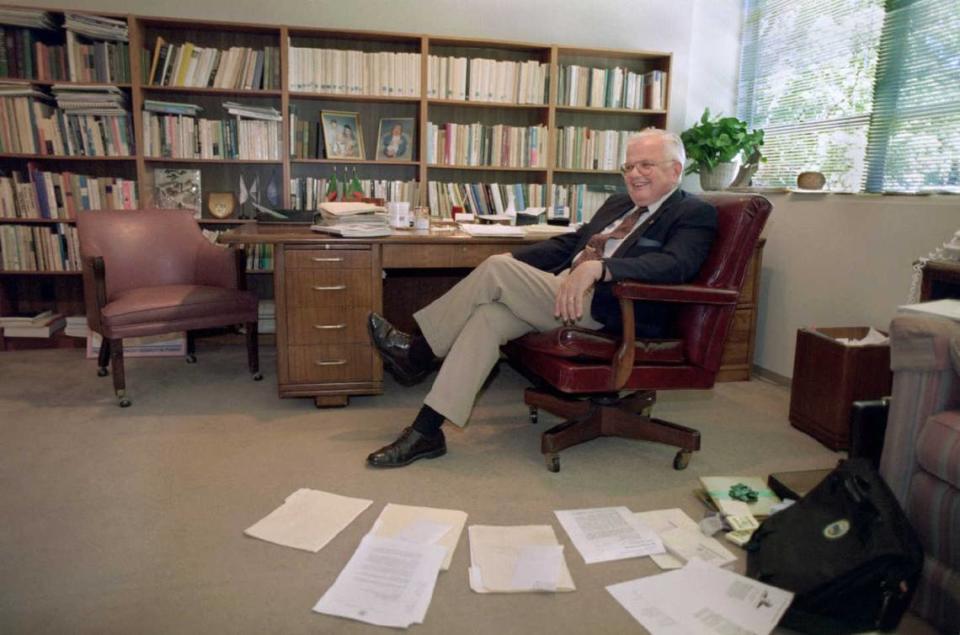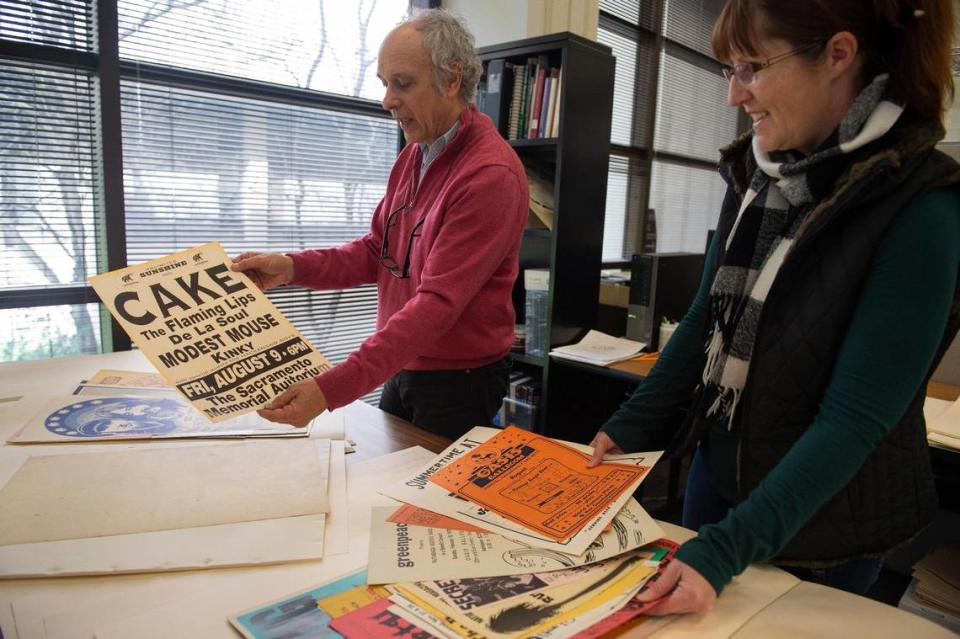Donald Gerth, longest-serving Sac State president, dies. He transformed the university
Donald R. Gerth, the longest-serving president in the history of Sacramento State, has died, leaving a rich legacy of accomplishments and an indelible imprint on the campus he loved.
Among his many contributions, he expanded that campus by 1.7 million square feet, established a School of the Arts, raised millions for university programs, spoke out about racism on campus, and defended affirmative action programs.
Gerth, who was 93, died Monday evening. No specific cause of death was given.
He took over the California State University, Sacramento, campus in the summer of 1984, inheriting an institution that had a reputation as an underperforming commuter school vexed by internal politics. Just before his arrival, an independent survey found the university lagging among other CSU campuses in teaching, innovation, and, particularly, in management.
Gerth responded by announcing a substantial reorganization of the university.
He hired new vice presidents, told The Sacramento Bee that he wanted a more “holistic” campus devoid of silos and fiefdoms. Just months into his tenure, Gerth met with leaders of the NAACP to address racism on campus. Within his first year, Gerth traveled to China on behalf of the university. The result was an exchange program of Chinese students learning at the Sacramento State campus while Sac State professors taught in China.
Transformed Sac State campus
A world traveler educated at the University of Chicago and Georgetown University, Gerth first began the work that remains central to the mission of Sacramento State today. In 1987, Gerth formed a commission to make Sacramento State more vital to the Sacramento region. In 1989, Gerth spoke of his hope that Sacramento State would be an institution dedicated to eradicating racism, foreshadowing the efforts of current President Robert Nelsen to make Sacramento State an anti-racism institution.
“Why shouldn’t it come up now,” Gerth said of difficult conversations he and his administrators were having with the community about race on campus. “Dealing with issues of race is a question in our culture that applies anytime. We’ve made a lot of progress, but we have a hell of a long way to go.”
Gerth also oversaw the painful process of Sacramento State athletics rising in the ranks, joining the Big Sky conference in 1995. The sports programs in Gerth’s day suffered many setbacks as the university sought to improve its facilities and opportunities for athletes. That hard work spurred plenty of internal and external criticism of Gerth. It is just now coming to fruition. This season, Sacramento State football won its second Big Sky championship.
“He loved Sacramento State and the CSU,” Nelsen said. “His impact on our campus and the system as a whole is unquantifiable. It was my honor to call him a friend, and I will miss his wise counsel. We have lost a hero and a giant of a man.”

Tough, and committed to students
Gerth’s friends and supporters said his longevity at Sacramento State, from 1984 to 2003, and his 45 years in the CSU system, spoke to his commitment to students, and to his toughness.
Despite his reputation as an academic, Gerth was also an Air Force captain trained in psychological warfare and intelligence. He was born in 1928 and raised in Chicago during the Great Depression, began earning money at 13 by working in a steel mill and as an insurance rating clerk. He dropped out of high school at 16 and enrolled at the University of Chicago. He would earn three degrees there.
Before coming to Sacramento State, Gerth began his 45 years of service in the CSU system as an associate dean at San Francisco State in 1958. He also served a decade as president of CSU Dominguez Hills in Carson beginning in 1974.
His life of achievement and personal toughness was expressed in many ways during his tenure.
In 1994, Gerth was faced a difficult challenge: The “don’t ask, don’t tell” military policies toward gay troops were at odds with the CSU policy of “access for all.” Gerth, the Air Force veteran, agonized over what to do and the answer was: Army and Air Force Reserve Officers Training (ROTC) programs might be phased out on campus.
By 1996, the backlash to Gerth’s difficult choice was stark. Congress and President Bill Clinton approved federal budget language that would have denied federal funds, including student grants and loans, to institutions that prohibited military recruiters on campus.
By 1997, Gerth and Sacramento State faculty reluctantly reversed course. A Sacramento Bee story said the federal government would have withheld $50 million in student aid otherwise.
“I believe our decision to assure all students equal protection was the right one,” Gerth said. “But it is also my primary responsibility to see that students are able to get an education through the financial assistance available to them. To have put student aid at risk would have been unconscionable.”
Also in 1996, Gerth opposed Proposition 209, which prohibits state institutions from considering race, sex, and ethnicity in public employment, education, and contracting. Then-University of California Regent Ward Connerly and others attacked Gerth’s opposition to ending so-called affirmative action programs in the state.
Michael J. Fitzgerald, Sacramento State’s chair of the faculty senate then, wrote in Gerth’s defense: “Gerth, a career academic, has spent most of his years in public life being so careful about the proper moves that he has been criticized by faculty for often being too conservative, too cautious, and simply too much of a ‘by-the-book’ kind of administrator. To accuse him of misusing his office and harboring anything but the best of intentions is ridiculous.”
In a Bee interview not long before the Prop. 209 flap, Gerth revealed his sense of perseverance: “Nobody’s making me be president,“ he said. “It’s voluntary, and I just have to do whatever I have to do.
“I’ve been around a long time,” he said. “It’s been a great adventure.”
Gerth spoke these words in the mid-’90s, even as some faculty members demanded he leave. “The faculty has lost confidence in the man,” said Professor Vernon Hornback, chairman of the English department. “His administration has become distant and non-approachable. He’s almost never here. When he is, it is to tell us how great he is and to preen.”
Gerth’s response? “Mother never said it would be easy.”
In 1999, Gerth responded to critics who said he was anti-sports by writing in a letter to The Bee: “Although I didn’t play team sports in college, I do still play tennis regularly and snow ski occasionally. ... There is no doubt that the discipline, teamwork, and rigor of team and individual sports can be invaluable throughout life. “
Improved relations, increased enrollment
By the time he retired in 2003, Gerth could claim credit for raising more than $100 million for modernization on campus. The Center for California Studies and the Center for Public Policy Dispute Resolution were founded on his watch. So was a master’s degree in public policy and administration and the first master’s degree in software engineering at a public university, a joint doctoral program with UC Santa Barbara.
Enrollment grew at Sacramento State from 22,000 to 28,000 in Gerth’s years as president. The enrollment of Asian and Latino students doubled.
“Few individuals have so wonderfully lived out the university’s highest ideals as Donald Gerth,” said CSU Chancellor Joseph I. Castro.
In 2018, Gerth and his wife Beverly donated $300,000 to the university, a gift that enabled Sacramento State to upgrade its campus archives so they could be accessible to the public.

“He loved being on campus, basking in author talks and attending as many scholarly presentations and celebrations as his and Bev’s calendar would allow,” said Amy Kautzman, the University Library dean. “His good cheer, amazing memory, and storytelling will be missed by all.”
Gerth is survived by Beverly, his wife of more than 60 years; daughters, Annette Schofield and Deborah Ann Hougham; Hougham’s husband, Harold; and five grandchildren.
Services are pending. In lieu of flowers, donations may be made to the President Emeritus Donald R. Gerth Memorial Scholarship Fund.

 Yahoo Movies
Yahoo Movies 
